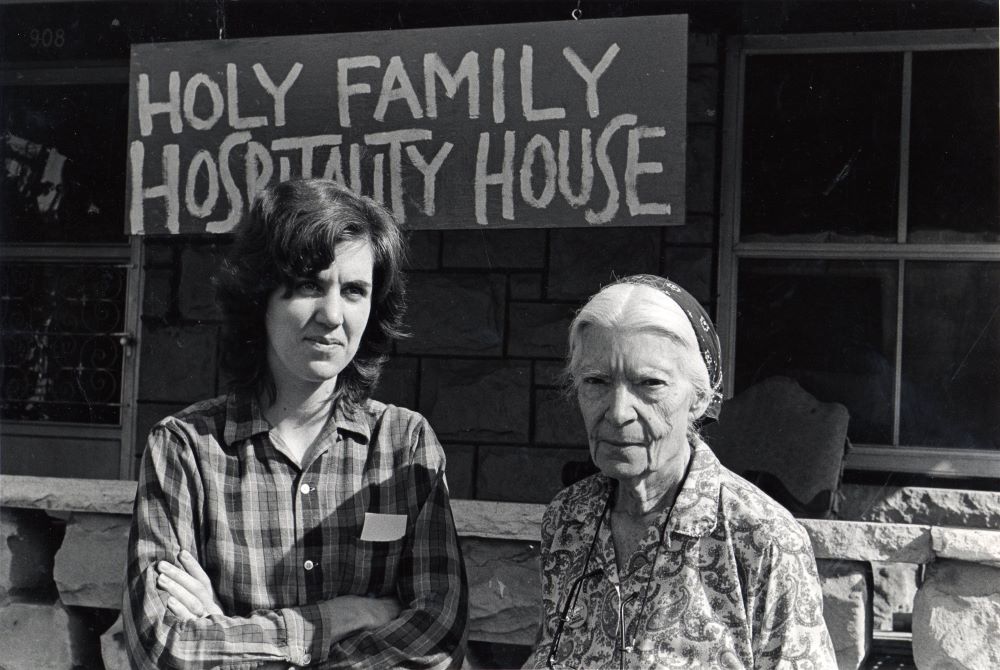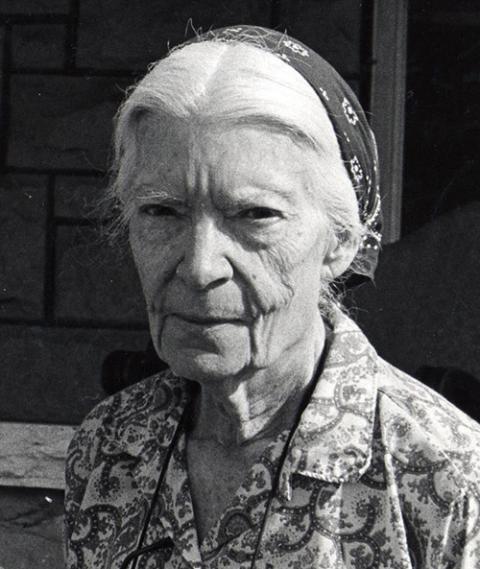
Dorothy Day, right, is pictured with Angie O'Gorman at Holy Family Hospitality House in Kansas City, Missouri, in the 1970s. (NCR photo/Albert de Zutter)
A famous saying attributed to Dorothy Day, the 20th-century Catholic peace activist and potentially future saint, states, "If peace is to be built, it must start with the individual. It is built brick by brick."
For more than 50 years, Pax Christi USA — the national Catholic peace movement founded in 1972, grounded in the Gospel and Catholic social teaching — has dedicated itself to the construction of a world without conflict.
On June 11 — at a breakfast before the annual spring meeting of the U.S. Conference of Catholic Bishops in Louisville, Kentucky — Pax Christi received the inaugural Dorothy Day Peacemaker Award from the Dorothy Day Guild. The award was entrusted to Bishop John Stowe of Lexington, Kentucky, bishop president of Pax Christi's national council, who had accepted the award on behalf of the organization.
The Dorothy Day Guild supports and advances Day's cause for sainthood, initiated by the Archdiocese of New York in 2000.
Day (1897-1980), a Catholic journalist and social activist, in 1933 co-founded with Peter Maurin the Catholic Worker Movement, whose 187 intentional communities are committed to nonviolence, voluntary prayer and hospitality for the homeless and marginalized.
"With so many conflicts in the world today, we thought it could be a sign of hope," Deirdre Cornell, co-chair of the Dorothy Day Guild executive committee and managing editor of Maryknoll Magazine, told OSV News. "We could connect Dorothy's commitment to peace and justice with the Catholic social teaching that very directly addresses peace and justice."
Cornell said the world "really needs this witness of people who call our attention to the possibility of using nonviolent means to address conflict — not to ignore conflict, but who have the courage to say, are there other ways to stop violence?"
Advertisement
The award comes as a new report by the Peace Research Institute of Oslo published June 10 confirmed the world saw in 2023 the most armed conflicts — 59 conflicts globally with 28 in Africa — than any other year since World War II (1939-1945) ended.
"A very essential part of Dorothy Day's vision and legacy is her commitment to peace and justice — using especially nonviolent means of achieving peaceful and just situations," Cornell said.
"So, as we look at how to bring her legacy into the future — and how to promote what she stood for — we feel that peace is such a need in our time; in our world. And we thought it was a very opportune moment to lift up this aspect of Dorothy's vision," Cornell said.
"She of course is very well known for her service to the poor; she is very well known for living a life of voluntary simplicity, or poverty, herself. But," Cornell added, "the peace aspect is one that we do not want to see forgotten."
Discerning that legacy is not easy, Cornell admitted.
"It's not like she leaves us a roadmap or a blueprint — she leaves a legacy that we now have to figure out how to carry out in our own time, and in our own situations," said Cornell. "But at least we want to bring that forward into the present — and not lose that very challenging, counter-cultural part of her message."
Dorothy Day Guild co-chair Kevin Ahern told OSV News, "We thought that by having a national award on peacebuilding, it could be a way to highlight the goodness that's happening in the church today ... people who are continuing to live Dorothy's legacy."
Day's connection to the Eucharist also is timely, noted Ahern, who also is director of the Dorothy Day Center for the Study and Promotion of Social Catholicism at Manhattan College in the Bronx borough of New York, where he is a professor of religious studies.
"As the church is celebrating the National Eucharistic Revival, we might recall that the last time there was a Eucharistic congress in the United States — in Philadelphia — that was one of Dorothy Day's last speaking engagements," Ahern said. "One of her main points of her talk was to link the Eucharist with peace — and especially the struggle to end nuclear weapons, and to end war."
To do that, said Ahern, many more peacebuilders are required.
"There's very much a need for peacemakers; a need for peacebuilders. It's one of the most pressing issues of our time. If you just open up a newspaper, you'll see the need for more people working for peace," Ahern said. "So if we can inspire more Catholics to do that, I think that's an appropriate way to promote Dorothy's legacy."

Dorothy Day in 1974 (NCR photo/Albert de Zutter)
"We're just thrilled at the idea that we're being awarded an award that reminds folks of Dorothy's witness and legacy," Johnny Zokovitch, executive director of Pax Christi USA, said.
Zokovitch, who departs his post this summer after five years, said the organization has many connections to Dorothy Day.
"In one way or another, Dorothy Day and the Catholic Worker Movement have been an influence in Pax Christi USA," Zokovitch noted. "Dorothy was the first speaker at our very first national conference — and a lot of folks, like myself, have spent time living and working at a Catholic Worker community."
Like Cornell, Zokivitch feels Day's peacebuilding efforts are an important aspect of her legacy.
"I think that for folks who do any digging into Dorothy's life, they understand that her witness was a witness for peace. One of the things that we've been reflecting a lot on is how, at the Vatican II Council, she and other women witnessed specifically — calling the church to a greater, more explicit repudiation of war, and a greater articulation of the church's teaching on peace," Zokovitch said. "And that's certainly at the heart of who we are as Pax Christi."
She reflected on what Day might make of the current state of conflict in the world.
"I think that Dorothy was a realist," Zokovitch said. "I think that she would look at what's happening in the world today, and the thing that she would be most concerned about is the church's own witness to peace — that regardless of the conflicts that are happening in the world; regardless of the war and the violence that is out there — that the church would be singular in its stance; unequivocal in its stance promoting peace and nonviolence."






